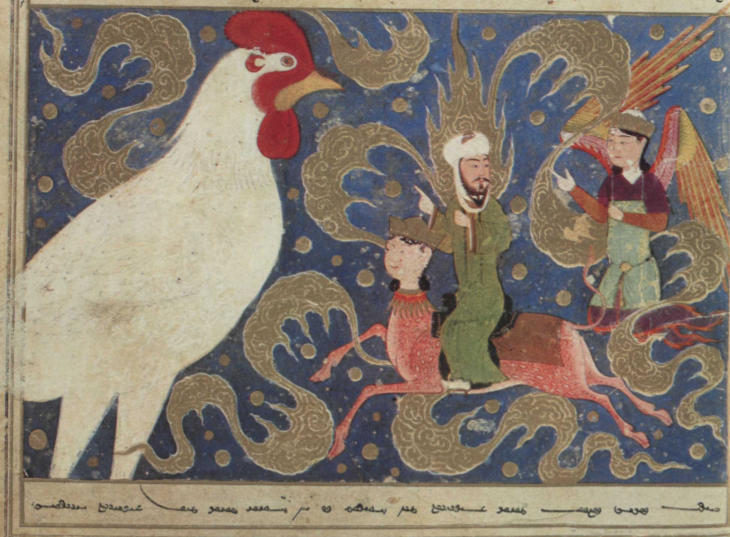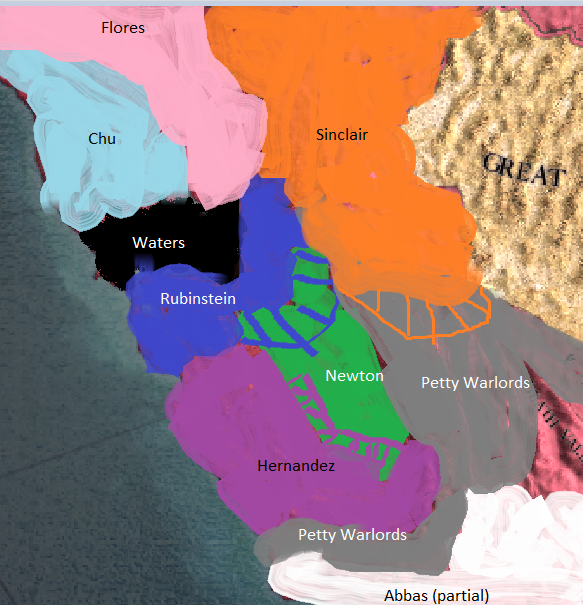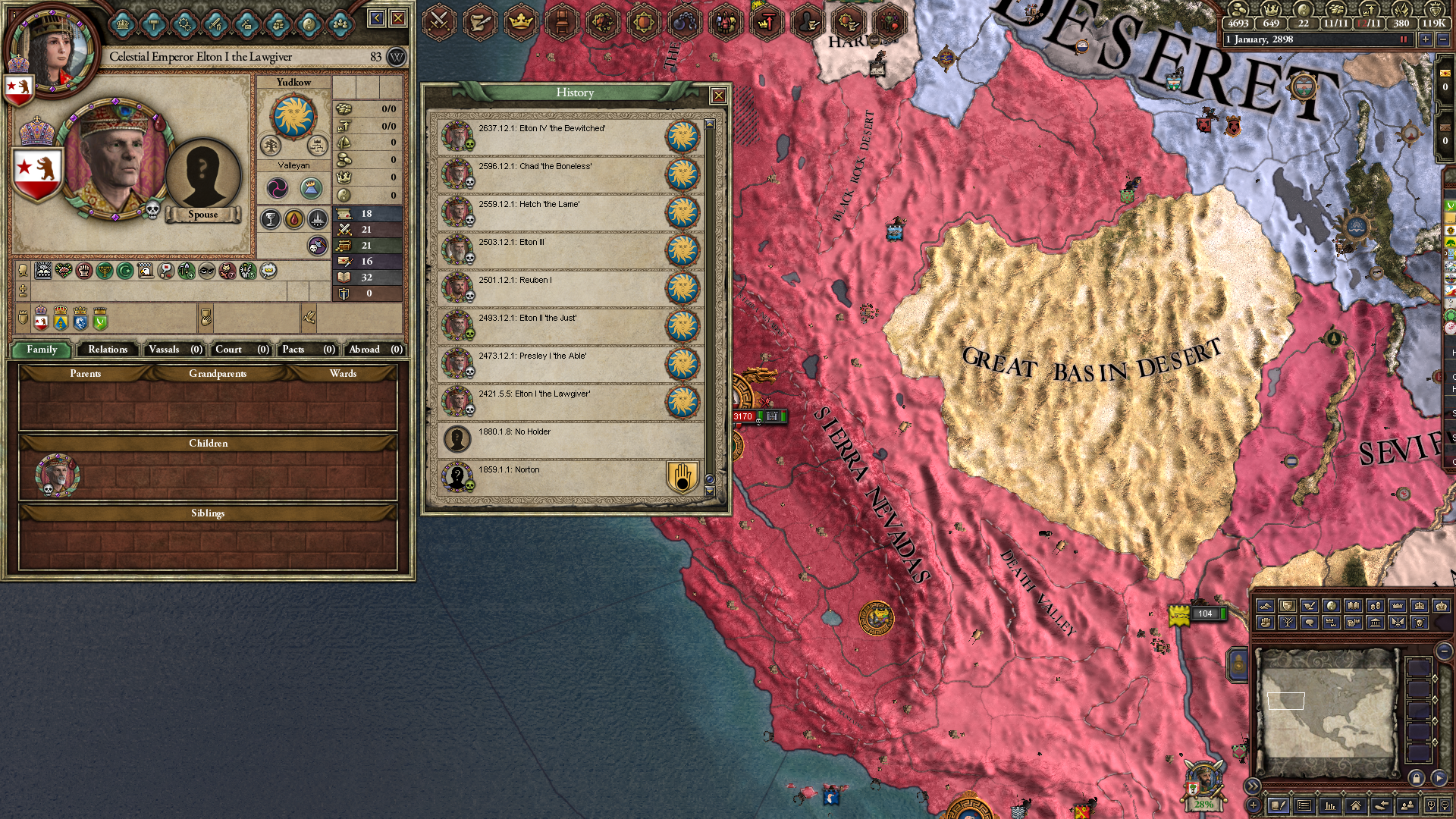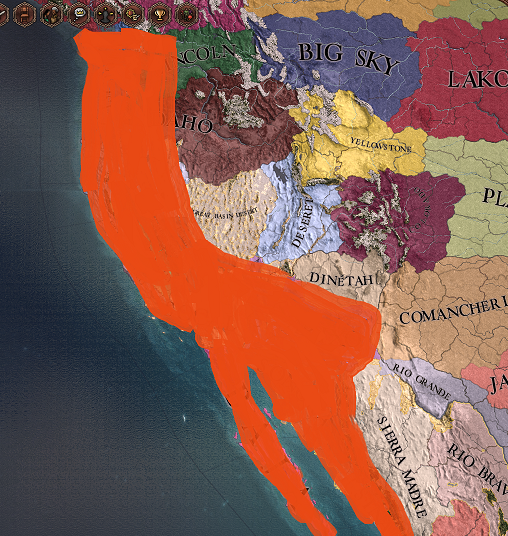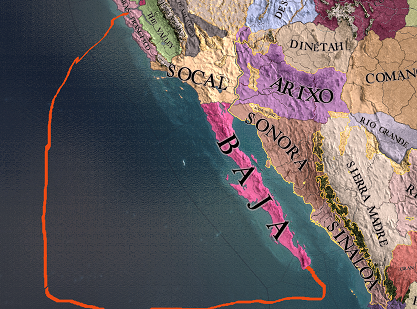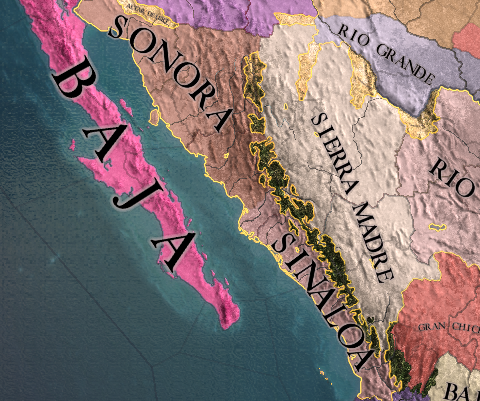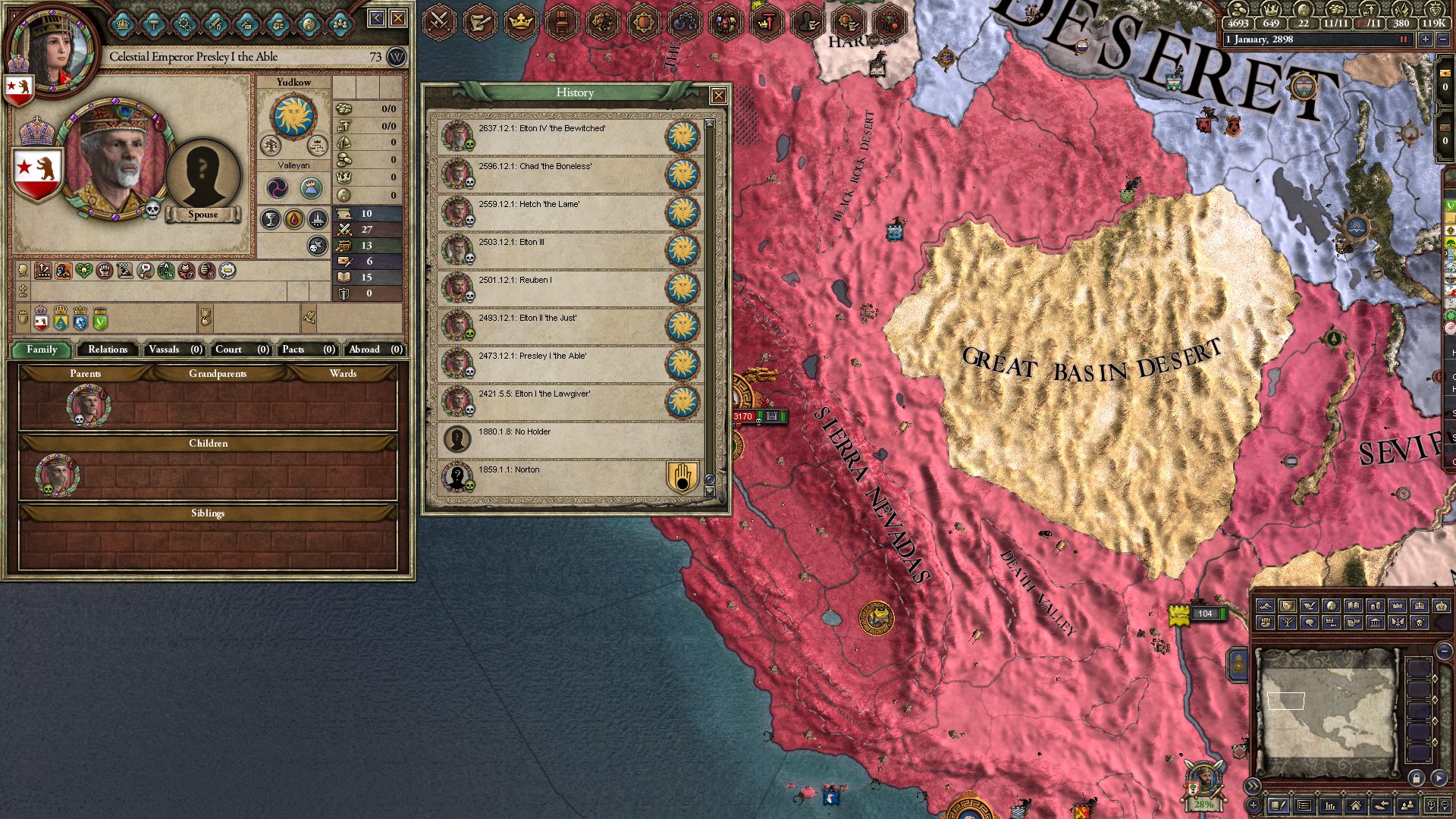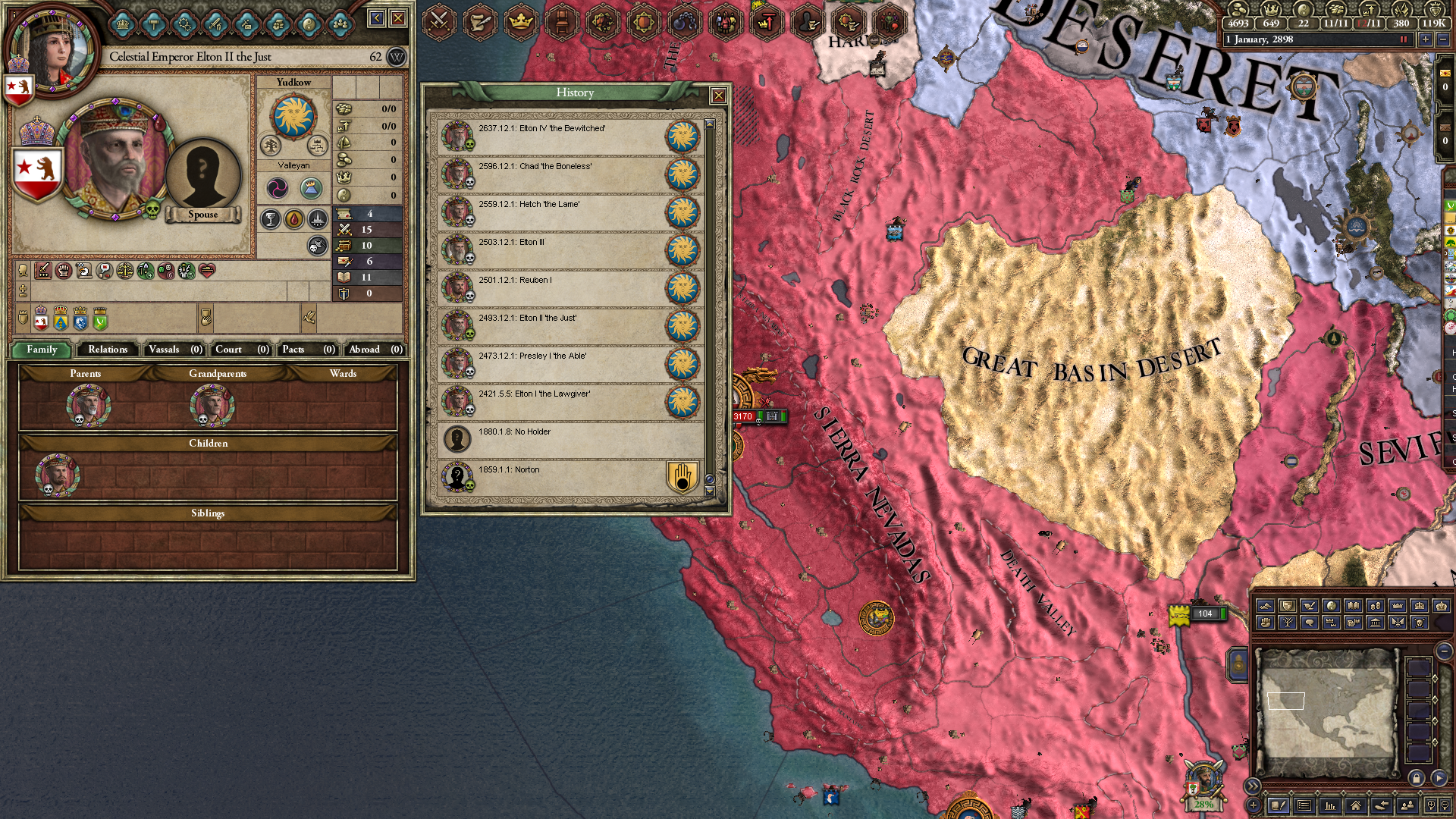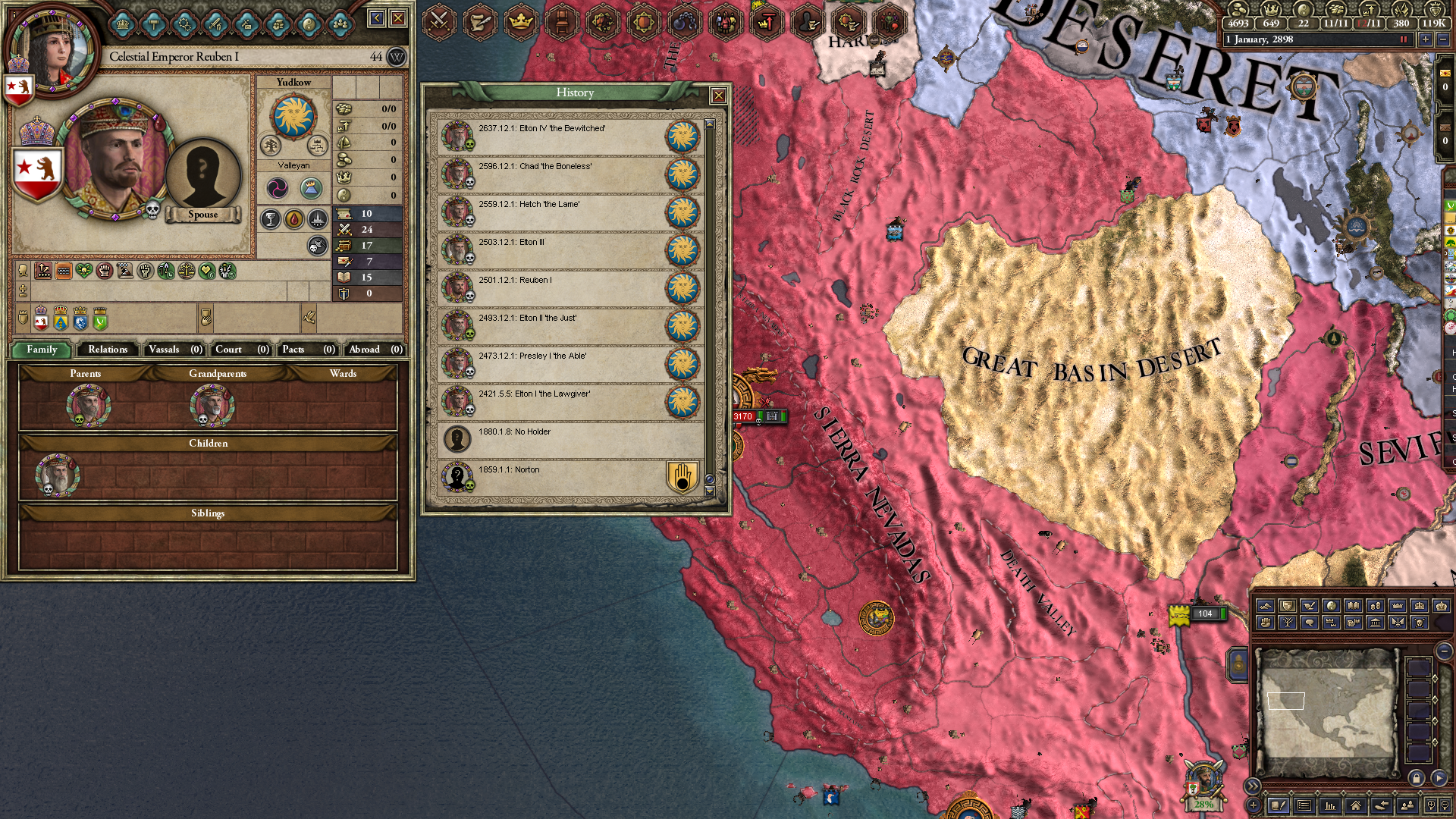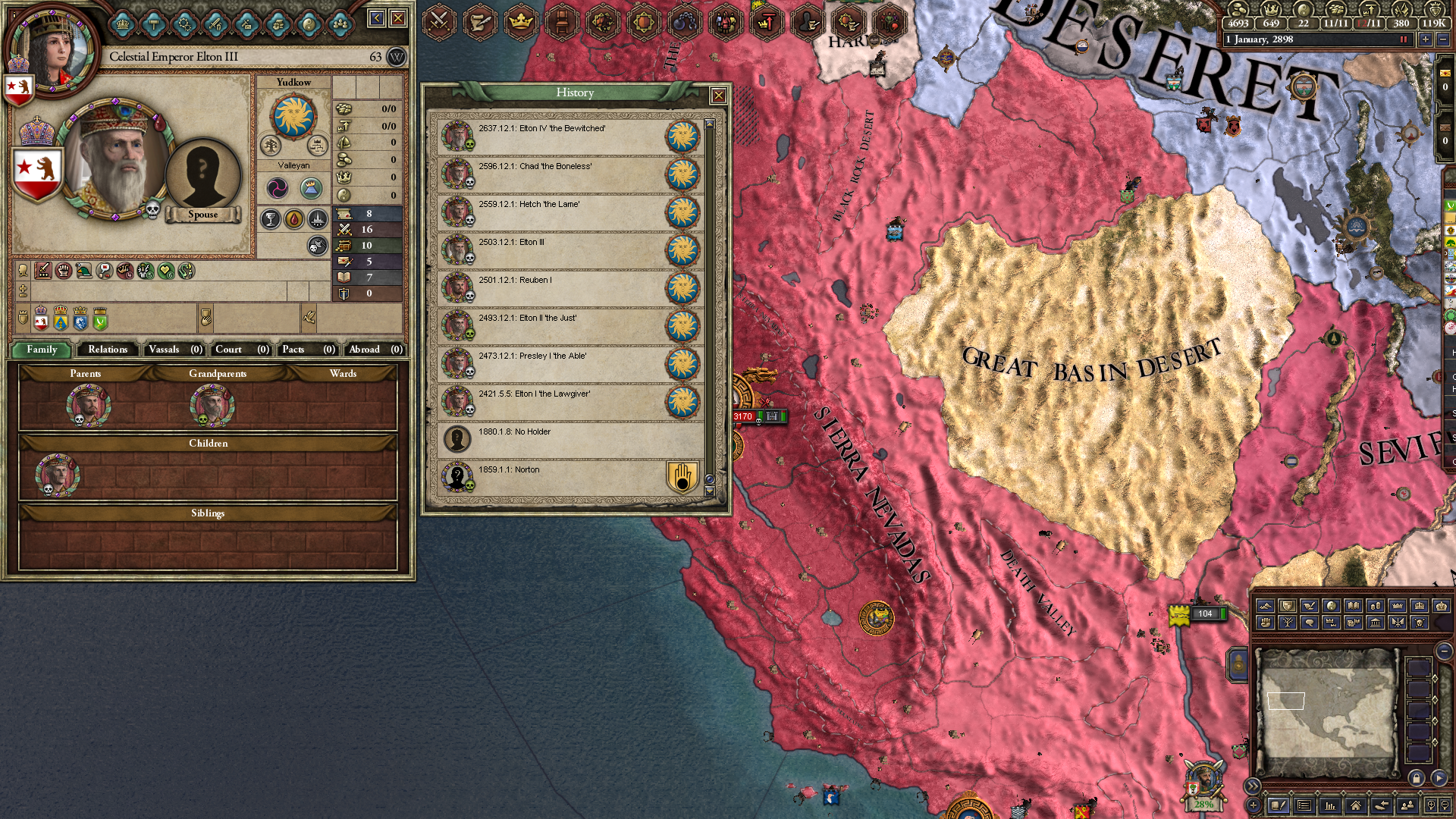To understand the Celestial Empire, we have to first understand the Cetic religion, for the two were inseparable. Our knowledge of the pre-Event world is not perfect, but to our knowledge, pre-event America was divided up into several broad cultural and geographical regions: the Northeast, Southeast, Heartland, Southwest, and Northwest. The three coasts of America, the West, East, and Gulf, were all more cosmopolitan and urban, in contrast to the more sparsely populated, rural Heartland. The East was the political and financial center, the West a cultural and technological center, and the Gulf broadly a service and light-industrial center. The West Coast, comprising the states of California, Oregon, and Washington (confusingly, the capital of ancient America was also named Washington), was always more religiously syncretic than any other region in America, and this dynamic only strengthened and grew more prominent after the Event, as the religions prominent in the major cities of the region—Seattle, Portland, San Francisco, Los Angeles, Sacramento, and San Diego—underwent significant changes. The idea of an approaching “New Age”, connected through means that we do not fully understand to the ancient zodiac symbol of Aquarius, was a common theme across the residents of California at the time, and the arrival of the Event only solidified that idea among the broader population. The Indian notions of reincarnation and its endless cycle, broken only by the most perfected soul, entered into this heterogenous mixture, as did remnants of Indigenous traditions, both genuine and imagined, particularly as regarded nature and environmentalism more broadly. Though the pre-Event West Coast did not always live up to its environmental ambitions, the broader populace had accepted the theory of “Spaceship Earth”, Earth as a closed system where all people had a role to play in maintenance, by the time of the Event (though the scholarship on this is dubious, resting more on the evidence of old soap containers than a historian might wish). Moderation of action and religious harmony were very much common themes in the region as well, unlike in the Heartland or the South more broadly. Religious strife post-Event, while present, more so than many acknowledge today, was not nearly at the level of much of the rest of the continent. The conditions, in short, were ripe for a grand synthesis of the faiths post-Event, which would likely have happened sooner or later even if Elton the Lawgiver had never lived. Others with talent could have found the moment and seized it, uniting the Pacific faiths through pen and sword, but Elton’s unique genius was that he bound the faith, state, and ruler inextricably together as had not existed since the days of Muhammad and the Four Rightly Guided Caliphs or Constantine’s endowment of lands to the Christian Church, perhaps outdoing even those. In doing so, however, he sowed the seeds for his line’s ultimate demise, his empire’s collapse, and his faith’s total destruction. In binding all parts together, he ensured that if one failed, all would fail.
The religion itself is instructive as well, and close study of its tenets and schools provides clues for consideration of the empire itself. Like any religion and/or philosophy, Ceticism was primarily concerned with living rightly and organizing society rightly. What did it mean for someone to be a “dude”? How was one supposed to remain “chill” when one was beset on all sides by injustice? How could one avoid falling to Mammon and becoming “The Man”? What, if anything, awaited after death? What wisdom could a person take from the Great Teachers (Muhammad, representing the bellicose Way of the Fist and the city of Sacramento; Jesus, representing the pacifistic Way of the Dove and the city of San Diego; the Buddha, representing the scholarly Way of the Book and the city of San Francisco, Henry David Thoreau, representing the Gaian-syncretic Way of the Branch and the city of Portland; Elron Hubbard, representing the pragmatic and manipulatory Way of the Cowl and the city of Los Angeles; and the First Emperor, supposed to embody all of those ways) and the Minor Teachers (an official tally in the 2880s ran to about eighty names, the most famous among them including Carl Sagan, Plato, Moses, Marcus Aurelius, and Joseph Smith) and what aspects of their teachings should be avoided?
On a more concrete level, how should one go about in the world? Given that greed was to be shunned at all costs, should one be profiting from one’s labor? If so, what percentage approximately would be extortionate, and in what profession would profit be most meritorious or least harmful? Should one patronize the business of someone you know to be inconsiderate towards others when fairly easy alternatives exist? What is one’s obligation to a family member who steals from you? Can you fraudulently sell or trade a product, even when you know it to be of better quality than what was asked for? How can one best care for a sickly child who lashes out at others? Is it problematic to eat meat and/or dairy products, and if not, would it be more meritorious to abstain? We know of these last few questions, and their answers, from Imperial Opinions, which were essentially crosses between a fatwa and a formal law. Citizens, from the most noble and wealthy to the poorest and humblest, could write in to the Imperial Court and the Emperor would evaluate their query, eventually distributing an answer to the entirety of California, an opinion that at once had the force of secular law and religious precedent. Since many of these queries were about purely personal, ethical matters, enforcement was rare, but it did occur.
A citizen, one Carlos F. of Redding, wrote in during the early reign of Terpen the Timekeeper (2743-2781) to ask whether officials who were claiming extra taxes in the name of the Emperor were telling the truth and sending it on, and in any case whether an unannounced double tax of that kind was justifiable, given the state of the peasantry there. Surprisingly, this scandal had not previously come to the attention of the Imperial Court, and its retribution was swift. The officials responsible were rounded up a day before the publication of the Opinion, made to read it and take responsibility for the lie in front of the Imperial person, then taken through every subprefectures of the Kingdom of Jefferson and do the same in front of the jeering crowds, visiting the subprefecture of Redding last. It was there that they were hanged, their corpses burned, and their families made to watch. It is somewhat unsurprising in this context to note that, for much of the reign of the Nine Good Emperors, graft and corruption in the Imperial Bureaucracy simply ceased to exist. The combination of a constant ear to the populist ground, strong scrutiny of the bureaucracy, and a willingness to be harsh to subordinates in order to maintain Imperial authority and order both physical and metaphysical would prove to be the toolkit that made the Emperors simultaneously awed, feared, loved, respected, and venerated for generations.
____________________________________________________________________________________________________________________________________________
Hey guys, thanks for following along! I'd appreciate any feedback if you have it. One big problem that's going to come up a little more in future that I didn't anticipate going in is that I have no idea how to write about Scientology while not getting sued, because the makers of the mod decided to put Hubbard up there with Jesus, Muhammad, and the Buddha in prominence for Ceticism. I guess that makes some sense considering Los Angeles, but still... Also, like I said in the first post, I'm trying to make this a little pompous and long-winded, but I'm worried it's a little too much so. Thoughts?
_____________________________________________________________________________________________________________________________________________
The religion itself is instructive as well, and close study of its tenets and schools provides clues for consideration of the empire itself. Like any religion and/or philosophy, Ceticism was primarily concerned with living rightly and organizing society rightly. What did it mean for someone to be a “dude”? How was one supposed to remain “chill” when one was beset on all sides by injustice? How could one avoid falling to Mammon and becoming “The Man”? What, if anything, awaited after death? What wisdom could a person take from the Great Teachers (Muhammad, representing the bellicose Way of the Fist and the city of Sacramento; Jesus, representing the pacifistic Way of the Dove and the city of San Diego; the Buddha, representing the scholarly Way of the Book and the city of San Francisco, Henry David Thoreau, representing the Gaian-syncretic Way of the Branch and the city of Portland; Elron Hubbard, representing the pragmatic and manipulatory Way of the Cowl and the city of Los Angeles; and the First Emperor, supposed to embody all of those ways) and the Minor Teachers (an official tally in the 2880s ran to about eighty names, the most famous among them including Carl Sagan, Plato, Moses, Marcus Aurelius, and Joseph Smith) and what aspects of their teachings should be avoided?
On a more concrete level, how should one go about in the world? Given that greed was to be shunned at all costs, should one be profiting from one’s labor? If so, what percentage approximately would be extortionate, and in what profession would profit be most meritorious or least harmful? Should one patronize the business of someone you know to be inconsiderate towards others when fairly easy alternatives exist? What is one’s obligation to a family member who steals from you? Can you fraudulently sell or trade a product, even when you know it to be of better quality than what was asked for? How can one best care for a sickly child who lashes out at others? Is it problematic to eat meat and/or dairy products, and if not, would it be more meritorious to abstain? We know of these last few questions, and their answers, from Imperial Opinions, which were essentially crosses between a fatwa and a formal law. Citizens, from the most noble and wealthy to the poorest and humblest, could write in to the Imperial Court and the Emperor would evaluate their query, eventually distributing an answer to the entirety of California, an opinion that at once had the force of secular law and religious precedent. Since many of these queries were about purely personal, ethical matters, enforcement was rare, but it did occur.
A citizen, one Carlos F. of Redding, wrote in during the early reign of Terpen the Timekeeper (2743-2781) to ask whether officials who were claiming extra taxes in the name of the Emperor were telling the truth and sending it on, and in any case whether an unannounced double tax of that kind was justifiable, given the state of the peasantry there. Surprisingly, this scandal had not previously come to the attention of the Imperial Court, and its retribution was swift. The officials responsible were rounded up a day before the publication of the Opinion, made to read it and take responsibility for the lie in front of the Imperial person, then taken through every subprefectures of the Kingdom of Jefferson and do the same in front of the jeering crowds, visiting the subprefecture of Redding last. It was there that they were hanged, their corpses burned, and their families made to watch. It is somewhat unsurprising in this context to note that, for much of the reign of the Nine Good Emperors, graft and corruption in the Imperial Bureaucracy simply ceased to exist. The combination of a constant ear to the populist ground, strong scrutiny of the bureaucracy, and a willingness to be harsh to subordinates in order to maintain Imperial authority and order both physical and metaphysical would prove to be the toolkit that made the Emperors simultaneously awed, feared, loved, respected, and venerated for generations.
____________________________________________________________________________________________________________________________________________
Hey guys, thanks for following along! I'd appreciate any feedback if you have it. One big problem that's going to come up a little more in future that I didn't anticipate going in is that I have no idea how to write about Scientology while not getting sued, because the makers of the mod decided to put Hubbard up there with Jesus, Muhammad, and the Buddha in prominence for Ceticism. I guess that makes some sense considering Los Angeles, but still... Also, like I said in the first post, I'm trying to make this a little pompous and long-winded, but I'm worried it's a little too much so. Thoughts?
_____________________________________________________________________________________________________________________________________________
Excellent, glad to have you on board.Hmm, I'm not normally interesting in AtE, but that introduction has me hooked.
Subbed!
It's apparently somewhat inspired by A Canticle for Liebowitz, if you've read that. In any event, the world experienced some unspecified cataclysm some time after the late 40s/early 50s, throwing the population back to essentially the medieval era by the 27th century. So there are literal Minnesota Vikings, the Amish, as the ones best prepared to survive a global shock, took over New York and Pennsylvania, Brazil has become an empire akin to China, things of that nature.This looks good fun. I'll have to reacquaint myself with After the End – I'm sure I knew what it entailed once upon a time, but I've only a vague idea now.
Good luck!
Last edited:
- 2
- 1








